Sherry Alexander's Blog, page 12
July 16, 2014
WEDNESDAY RANT: Why would you leave a kid in the car?
Every summer we hear about child deaths in hot cars, yet the number of deaths is rising. So, why would you leave a kid in the car, or better yet, how could you forget your child in the car?The recent death of 22 month old Cooper from Georgia is inexplicable to me. Leaving any child in the car unattended is beyond comprehension. Yes, I know there are times when parents or caregivers are unbuckling car seats for multiple children, a child might have to wait until he/she gets unbuckled. I am not talking about that. I have had to do that myself. What I do not understand--and never will--is how a parent can leave a child in a car and totally forget about him/her.
So far this year, 14 children have died as a result of being left in a hot car. Last year it was 40 kids. According to the fact sheet put out by The Dept. of Earth and Climate Services at San Francisco State University, the deaths break down this way:51 percent are actually forgotten29 percent are kids who get trapped after playing in an unattended car18 percent are left intentionally1 percent are unknownThrough my years at 9-1-1, there were numerous incidents where children were left in cars. In most of these cases, the parent(s) thought the child was sleeping and went into the store to shop. Really? Thank heavens for the alert passerby who called us to dispatch police or fire, and then waited at the car to direct emergency personnel. A sleeping child may have been the reason in these cases, but come on! Is buying a new pair of shoes so important to you that you would let your baby die of hyperthermia? If it is, then you do not deserve the privilege of being a parent.
I know, I know, the experts defend the actions of parents who have left their child in the car. They say that a part of our brain shuts down when we do a patterned behavior, and if dropping the child off at day care is not the norm, then it's easy to see how the child is forgotten. There is even a button put out by the National Weather Service to help parents remember. I've attached it below. And, yes I feel sorry for the parent who actually does accidentally leave their son or daughter in the car. This is truly tragic. I can have empathy--yes--but understand the action--no.
The temperature inside of car--even in mild weather--can raise dramatically when the sun is out. In fact in the first 10 minutes, the temperature can raise 19 degrees. So leaving a child inside a car in 80 degree weather for that quick 10 minute trip inside the local Seven Eleven is leaving him/her to slow cook in a 109 degree oven.
Perhaps if these parents really though about hyperthermia the way emergency responders and 9-1-1 dispatchers do, this would not happen. We see and hear hundreds of cases where an adult has been in the sun without water and quickly succumbs to the heat. They complain of being dizzy, confused, agitated, and in extreme cases, lose consciousness or have a seizure. This can be expected if the body's core temperature rises from our usual 98.6 to 104 degrees. Children, however, experience hyperthermia three to four times faster than an adult, and when their body's temperature rises to 107 degrees, the internal organs begin to shut down. Can you imagine what a painful and excruciating death it would be to bake alive in the backseat of a car. I can. So here are a few safety tips to consider, so this never happens to you.
DO NOT LEAVE A CHILD IN THE CARGet your kids out of the car first--before your purse, diaper bag, groceries, briefcase, or whateverAsk your day care provider to call you if your child does not arrive at day care.Ask your day care provider what their plan is to make sure your child isn't left in their car.Warn your kids about playing in the car when you are not therePut the diaper bag in the passenger seat instead of the back to remind you that the child is with you.if you are a passerby who sees a child left in a car, call 9-1-1Get one of the stickers below to put on your car window or dash to help you rememberLastly, if help is a ways away such as in a rural area, and you can see the child is in danger, break the window. Some states are now making laws that allow this action and preventing the legal law suit for damages that occur when the window is shattered.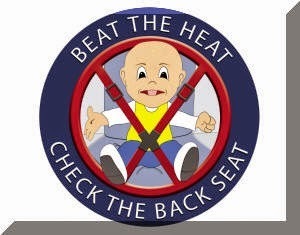
Kids--all kids--are our future and it is up to us to determine what that future will be.
So far this year, 14 children have died as a result of being left in a hot car. Last year it was 40 kids. According to the fact sheet put out by The Dept. of Earth and Climate Services at San Francisco State University, the deaths break down this way:51 percent are actually forgotten29 percent are kids who get trapped after playing in an unattended car18 percent are left intentionally1 percent are unknownThrough my years at 9-1-1, there were numerous incidents where children were left in cars. In most of these cases, the parent(s) thought the child was sleeping and went into the store to shop. Really? Thank heavens for the alert passerby who called us to dispatch police or fire, and then waited at the car to direct emergency personnel. A sleeping child may have been the reason in these cases, but come on! Is buying a new pair of shoes so important to you that you would let your baby die of hyperthermia? If it is, then you do not deserve the privilege of being a parent.
I know, I know, the experts defend the actions of parents who have left their child in the car. They say that a part of our brain shuts down when we do a patterned behavior, and if dropping the child off at day care is not the norm, then it's easy to see how the child is forgotten. There is even a button put out by the National Weather Service to help parents remember. I've attached it below. And, yes I feel sorry for the parent who actually does accidentally leave their son or daughter in the car. This is truly tragic. I can have empathy--yes--but understand the action--no.
The temperature inside of car--even in mild weather--can raise dramatically when the sun is out. In fact in the first 10 minutes, the temperature can raise 19 degrees. So leaving a child inside a car in 80 degree weather for that quick 10 minute trip inside the local Seven Eleven is leaving him/her to slow cook in a 109 degree oven.
Perhaps if these parents really though about hyperthermia the way emergency responders and 9-1-1 dispatchers do, this would not happen. We see and hear hundreds of cases where an adult has been in the sun without water and quickly succumbs to the heat. They complain of being dizzy, confused, agitated, and in extreme cases, lose consciousness or have a seizure. This can be expected if the body's core temperature rises from our usual 98.6 to 104 degrees. Children, however, experience hyperthermia three to four times faster than an adult, and when their body's temperature rises to 107 degrees, the internal organs begin to shut down. Can you imagine what a painful and excruciating death it would be to bake alive in the backseat of a car. I can. So here are a few safety tips to consider, so this never happens to you.
DO NOT LEAVE A CHILD IN THE CARGet your kids out of the car first--before your purse, diaper bag, groceries, briefcase, or whateverAsk your day care provider to call you if your child does not arrive at day care.Ask your day care provider what their plan is to make sure your child isn't left in their car.Warn your kids about playing in the car when you are not therePut the diaper bag in the passenger seat instead of the back to remind you that the child is with you.if you are a passerby who sees a child left in a car, call 9-1-1Get one of the stickers below to put on your car window or dash to help you rememberLastly, if help is a ways away such as in a rural area, and you can see the child is in danger, break the window. Some states are now making laws that allow this action and preventing the legal law suit for damages that occur when the window is shattered.

Kids--all kids--are our future and it is up to us to determine what that future will be.
Published on July 16, 2014 10:29
July 13, 2014
WHY ARE KIDS FLOODING ACROSS THE BORDER
I am not one to get involved in politics, and I understand this is a hot political issue right now, but I have to ask: Why would a parent send a child on a thousand to two thousand mile trip alone?From what I have read that is the question on the minds of millions of Americans. I have to admit that I asked myself the same thing. It's hard to imagine sending a small child on such a journey. Yet, children as young as six years of age are walking up to Border Agents, exhausted, alone, and begging for asylum. According to recent estimates, more than 50,000 kids have crossed the Mexican border since October 2013. They are mostly from Central American countries such as El Salvador, Guatemala, and Honduras. I wondered what their mothers were thinking, then I researched their countries.
The travel brochures for all three countries talk about pristine beaches, inspiring volcanoes, unique wildlife, friendly people, and breathtaking vistas. But what they don't talk about is the violence, poverty, and lack of economic growth.
Each year the Heritage Foundation releases a report on economic freedom which tracks the "advancement in economic freedom, prosperity, and opportunity. The 2014 Index of Economic Freedom sheds light on the reasons why parents are helping their children flee their countries.
Take El Salvador for instance, their economic growth is considered stagnant. Why? Because corruption and violence "is a serious problem". It fits with the stories the kids are sharing--gang violence, rampant crime, and limited or no law enforcement.
It's basically the same story for Guatemala and Honduras--poverty, no property rights, gang violence, and drug cartels. Even UNICEF considers the region to be the "most unequal" in the world. More than 40 percent of the population in these countries are children under the age of 18, and over half of them live in poverty with no hope for the future.
To most of these families, the only possibility to improve their lives and those of their children is to cross the border into the United States. To them the danger of such a long journey and the possibility of death en-route is worth the possibility of freedom and security. Given the same circumstances, I would flee my country too. The only difference, is that I would not send my kids alone. I would go with them--even if the laws in the United States made it impossible for me to stay (our laws send adult illegals back, but do not send children who arrive without an adult back until their case is reviewed) --I would still not send them alone.
NEXT WEEK: The Child Trafficking Series.
Kids--all kids--are our future and it is up to us to determine what that future will be.
The travel brochures for all three countries talk about pristine beaches, inspiring volcanoes, unique wildlife, friendly people, and breathtaking vistas. But what they don't talk about is the violence, poverty, and lack of economic growth.
Each year the Heritage Foundation releases a report on economic freedom which tracks the "advancement in economic freedom, prosperity, and opportunity. The 2014 Index of Economic Freedom sheds light on the reasons why parents are helping their children flee their countries.
Take El Salvador for instance, their economic growth is considered stagnant. Why? Because corruption and violence "is a serious problem". It fits with the stories the kids are sharing--gang violence, rampant crime, and limited or no law enforcement.
It's basically the same story for Guatemala and Honduras--poverty, no property rights, gang violence, and drug cartels. Even UNICEF considers the region to be the "most unequal" in the world. More than 40 percent of the population in these countries are children under the age of 18, and over half of them live in poverty with no hope for the future.
To most of these families, the only possibility to improve their lives and those of their children is to cross the border into the United States. To them the danger of such a long journey and the possibility of death en-route is worth the possibility of freedom and security. Given the same circumstances, I would flee my country too. The only difference, is that I would not send my kids alone. I would go with them--even if the laws in the United States made it impossible for me to stay (our laws send adult illegals back, but do not send children who arrive without an adult back until their case is reviewed) --I would still not send them alone.
NEXT WEEK: The Child Trafficking Series.
Kids--all kids--are our future and it is up to us to determine what that future will be.
Published on July 13, 2014 14:15
July 9, 2014
Wednesday's Rantings and Ravings: Picture Books to Rave About
As a participant in Julie Hedlund's 12X12 challenge, I am not only writing picture book drafts, but I am anxiously reading new releases too. This week's "Rave" is for three books I found that made me laugh, and warmed my heart. I hope you enjoy them as much as I did.
 Under the Same Sun
by Sharon Robinson is a heart warming account of family. Written about a reunion visit to Tanzania for the author's mother's eighty-fifth birthday, it takes the reader on a journey that celebrates the loving bond of a family even though they live thousands of miles from each other. As an added bonus, Robinson included a world map showing where Tanzania is located, pictures of a Tanzanian meal, and a small glossary of Swahili words used in the text.
Under the Same Sun
by Sharon Robinson is a heart warming account of family. Written about a reunion visit to Tanzania for the author's mother's eighty-fifth birthday, it takes the reader on a journey that celebrates the loving bond of a family even though they live thousands of miles from each other. As an added bonus, Robinson included a world map showing where Tanzania is located, pictures of a Tanzanian meal, and a small glossary of Swahili words used in the text.

Shoe Dog by Megan McDonald is a hilarious book about a dog who has trouble resisting the urge to eat his human's new shoes. "Shoe Dog Liked to chew. And chew, and chew." Chewing is great for dogs, but for Shoe Dog it leads to big trouble. Can he quit chewing? Will his human return him to the shelter? Shoe Dog's struggle to break a bad habit will make the both of you laugh.
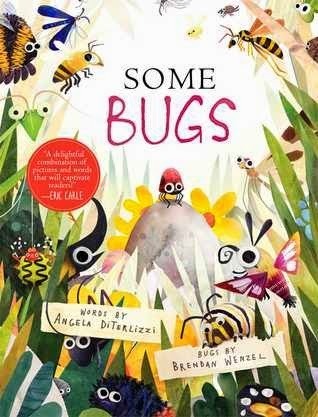 Some Bugs
by Angela Diterlizzi has a lot of bugs! The artwork by Brendan Wenzel is outstanding. There are bugs that fly and buzz, and ones that hide and hunt. It's full of bugs and what they do. Kids will be excited to do what the book suggests: "Grab you magnifying glass!" What a great idea for a summer outing.
Some Bugs
by Angela Diterlizzi has a lot of bugs! The artwork by Brendan Wenzel is outstanding. There are bugs that fly and buzz, and ones that hide and hunt. It's full of bugs and what they do. Kids will be excited to do what the book suggests: "Grab you magnifying glass!" What a great idea for a summer outing.
Note: Wednesday's blogs are now the rantings and ravings of yours truly. Tune in next Wednesday to see what I am ranting about.
 Under the Same Sun
by Sharon Robinson is a heart warming account of family. Written about a reunion visit to Tanzania for the author's mother's eighty-fifth birthday, it takes the reader on a journey that celebrates the loving bond of a family even though they live thousands of miles from each other. As an added bonus, Robinson included a world map showing where Tanzania is located, pictures of a Tanzanian meal, and a small glossary of Swahili words used in the text.
Under the Same Sun
by Sharon Robinson is a heart warming account of family. Written about a reunion visit to Tanzania for the author's mother's eighty-fifth birthday, it takes the reader on a journey that celebrates the loving bond of a family even though they live thousands of miles from each other. As an added bonus, Robinson included a world map showing where Tanzania is located, pictures of a Tanzanian meal, and a small glossary of Swahili words used in the text.
Shoe Dog by Megan McDonald is a hilarious book about a dog who has trouble resisting the urge to eat his human's new shoes. "Shoe Dog Liked to chew. And chew, and chew." Chewing is great for dogs, but for Shoe Dog it leads to big trouble. Can he quit chewing? Will his human return him to the shelter? Shoe Dog's struggle to break a bad habit will make the both of you laugh.
 Some Bugs
by Angela Diterlizzi has a lot of bugs! The artwork by Brendan Wenzel is outstanding. There are bugs that fly and buzz, and ones that hide and hunt. It's full of bugs and what they do. Kids will be excited to do what the book suggests: "Grab you magnifying glass!" What a great idea for a summer outing.
Some Bugs
by Angela Diterlizzi has a lot of bugs! The artwork by Brendan Wenzel is outstanding. There are bugs that fly and buzz, and ones that hide and hunt. It's full of bugs and what they do. Kids will be excited to do what the book suggests: "Grab you magnifying glass!" What a great idea for a summer outing. Note: Wednesday's blogs are now the rantings and ravings of yours truly. Tune in next Wednesday to see what I am ranting about.
Published on July 09, 2014 20:58
July 6, 2014
KIDS WITH PARENTS IN JAIL SERIES: WHEN KIDS DON'T WANT TO STAY IN CONTACT
There are numerous reasons why a child may not want to call, write or visit an incarcerated parent. Understanding why is the first step toward knowing how to help.It's impossible to identify all the reasons a child may refuse contact with a parent who is in jail. As discussed in earlier posts, the child may feel resentful and angry, and until those emotions are dealt with, he/she may not want contact. However, a child's resistance to speaking with a parent may go beyond anger and resentment.
With over 6 million children abused or neglected in the U.S. each year resulting in an average of four deaths each and every day, it's understandable that an abused child may not want a relationship with his/her abuser. Communication is not the most important factor in these cases. Help for the child through counseling and intervention is.
Besides abuse and neglect, the previous parent-child relationship must be considered. According to the latest statistics, three out of four people in jail have a history of addiction to drugs or alcohol. No parent is perfect, but when addictions take over a parent, the child's needs and welfare take a back seat. The attention shifts from the child to acquiring the drug or alcohol and the high it provides, and the safe environment a child needs to grow is sacrificed. Coming from this relationship, a child may feel relieved that the parent is in jail. Even if the parent receives treatment while incarcerated, the child may not want to see them. This can be especially true if he/she has never known a sober parent before. In these cases, it is the parent who must reach out and patiently rebuild a relationship.
Lastly the refusal may be a direct result of the prison communication system itself. Most prisons and jails are not set up to maintain a healthy parent and child relationship. A child with a problem cannot talk immediately with a parent. He/she must wait for the parent to call, or sit down and write a letter, or, if he/she is close enough for a visit, wait until visiting day. With all the rules and regulations that are required when a person is incarcerated, it is easy to see why a child may feel that it just isn't worth all the trouble to stay in contact with an incarcerated parent.
So, what can a caregiver do if a child refuses contact with a parent in jail?
Talk to the child to determine the reason he/she does not want contact.Seek help from counselors, social workers, and trusted family members.If abuse is the reason, let the counselor and child determine if and when to resume contactMake sure the parent does his/her part through letters and phone callsIf the child agrees to a visit, make parents understand the focus is the child not themBe patient
Kids--all kids--are our future, and it up to us to determine what that future will be.
With over 6 million children abused or neglected in the U.S. each year resulting in an average of four deaths each and every day, it's understandable that an abused child may not want a relationship with his/her abuser. Communication is not the most important factor in these cases. Help for the child through counseling and intervention is.
Besides abuse and neglect, the previous parent-child relationship must be considered. According to the latest statistics, three out of four people in jail have a history of addiction to drugs or alcohol. No parent is perfect, but when addictions take over a parent, the child's needs and welfare take a back seat. The attention shifts from the child to acquiring the drug or alcohol and the high it provides, and the safe environment a child needs to grow is sacrificed. Coming from this relationship, a child may feel relieved that the parent is in jail. Even if the parent receives treatment while incarcerated, the child may not want to see them. This can be especially true if he/she has never known a sober parent before. In these cases, it is the parent who must reach out and patiently rebuild a relationship.
Lastly the refusal may be a direct result of the prison communication system itself. Most prisons and jails are not set up to maintain a healthy parent and child relationship. A child with a problem cannot talk immediately with a parent. He/she must wait for the parent to call, or sit down and write a letter, or, if he/she is close enough for a visit, wait until visiting day. With all the rules and regulations that are required when a person is incarcerated, it is easy to see why a child may feel that it just isn't worth all the trouble to stay in contact with an incarcerated parent.
So, what can a caregiver do if a child refuses contact with a parent in jail?
Talk to the child to determine the reason he/she does not want contact.Seek help from counselors, social workers, and trusted family members.If abuse is the reason, let the counselor and child determine if and when to resume contactMake sure the parent does his/her part through letters and phone callsIf the child agrees to a visit, make parents understand the focus is the child not themBe patient
Kids--all kids--are our future, and it up to us to determine what that future will be.
Published on July 06, 2014 13:29
July 2, 2014
ARE YOUR KIDS IN DANGER AT DAY CARE?
If your kids are in day care, are they in danger? What if your day care provider smokes pot while the kids are there, or takes pain killers, or has a glass of wine or a couple of beers? Not at my day care, you say? But, are you sure?Last week a local news station caught day care workers smoking bongs while caring for children. The owners of the facility in Salem, Oregon readily admitted to smoking marijuana while children were nearby. They excused their behavior by stating that they had medical marijuana cards, and smoked during the day so they could "move around" and take care of the kids left at their center. That may not bother some of you who read this blog, but it makes me spitting mad!
I am not against a person in pain finding relief. However, I am against a person in pain finding relief while caring for a child. Smoking pot, taking opiates, or consuming alcohol may ease the pain, and it may help a person "move around", but it also slows the reaction time; distorts a person's sense of time; increases the heart rate and the blood pressure; and, can cause short term memory loss. Do you really want your child left with someone who can't respond to an emergency, or remember to change the baby's diaper?
Why do I care where parents leave their kids? Because for seven years, I was a state-certified, family day care provider. I even wrote a book to help other day care providers establish a family day care home where kids would be safe, and their emotional, cognitive, social, and physical needs would be well cared for. I am a firm believer that quality care has a positive and lasting impact on a child's development.
According to the Childcare In America Fact Sheet published by Child Care-Aware of America, there are over 15 million children under the age of 6 that require child care. Those kids are split between the 117,000 day care centers, 209,000 family day care homes, 4,200 programs such as Head Start, and a multitude of other arrangements ranging from a grandmother to a neighbor, and from a teenager out of school for the summer to a sibling. So how does a parent know whether or not their children are safe? Simply put, ask questions and investigate.
Ask if anyone responsible for the care of the child has a medical marijuana card and smokes while caring for the child. Do background checks on all providers and staff. Check the Better Business Bureau for complaints, and check with the State to see if they are registered or licensed. Make unannounced visits to check on your child. Ask to see the weekly menus to determine what your child is eating. Ask what their cleaning practices are--how often is the bathroom cleaned, what products are used, and if they stored away from the child's reach. Trust your nose--for instance, do you smell urine when you walk in the door unannounced? Finally, talk to your child. Ask what they did all day, who took care of them, what they ate, who they played with, and if they like it there. Parents are often the only advocate a child has--so step up to the plate and advocate! Make sure your kids are not in danger while you are at work.
Kids--all kids--are our future, and it is up to use to determine what that future will be.
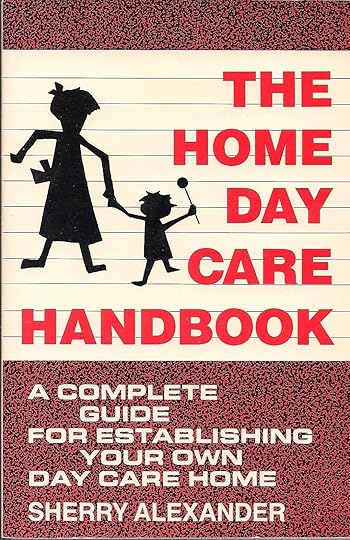
I am not against a person in pain finding relief. However, I am against a person in pain finding relief while caring for a child. Smoking pot, taking opiates, or consuming alcohol may ease the pain, and it may help a person "move around", but it also slows the reaction time; distorts a person's sense of time; increases the heart rate and the blood pressure; and, can cause short term memory loss. Do you really want your child left with someone who can't respond to an emergency, or remember to change the baby's diaper?
Why do I care where parents leave their kids? Because for seven years, I was a state-certified, family day care provider. I even wrote a book to help other day care providers establish a family day care home where kids would be safe, and their emotional, cognitive, social, and physical needs would be well cared for. I am a firm believer that quality care has a positive and lasting impact on a child's development.
According to the Childcare In America Fact Sheet published by Child Care-Aware of America, there are over 15 million children under the age of 6 that require child care. Those kids are split between the 117,000 day care centers, 209,000 family day care homes, 4,200 programs such as Head Start, and a multitude of other arrangements ranging from a grandmother to a neighbor, and from a teenager out of school for the summer to a sibling. So how does a parent know whether or not their children are safe? Simply put, ask questions and investigate.
Ask if anyone responsible for the care of the child has a medical marijuana card and smokes while caring for the child. Do background checks on all providers and staff. Check the Better Business Bureau for complaints, and check with the State to see if they are registered or licensed. Make unannounced visits to check on your child. Ask to see the weekly menus to determine what your child is eating. Ask what their cleaning practices are--how often is the bathroom cleaned, what products are used, and if they stored away from the child's reach. Trust your nose--for instance, do you smell urine when you walk in the door unannounced? Finally, talk to your child. Ask what they did all day, who took care of them, what they ate, who they played with, and if they like it there. Parents are often the only advocate a child has--so step up to the plate and advocate! Make sure your kids are not in danger while you are at work.
Kids--all kids--are our future, and it is up to use to determine what that future will be.

Published on July 02, 2014 16:11
June 29, 2014
Kids With Parents in Jail Series: Staying Connected
When parents go to jail, children feel lost, insecure, and alone. One way to combat those feelings are to allow the kids to maintain contact through letters, phone calls, or personal visits.While there are very few studies that detail the results of continued contact between children and their incarcerated parents, the general belief is that it is beneficial for both parent and child. Parents benefit by staying part of the family unit which may help them to stay out of trouble when they are released. Children benefit by knowing that even though their parent is in jail, they are still loved. True there are exceptions to maintaining a relationship--abuse and neglect are two of them. But I am not talking about parents who never were parents in the first place. I am talking about allowing children who are not going to be hurt by a connection with their parents being allowed to communicate their thoughts and feelings with their incarcerated parent.
Writing letters is probably the easiest way for kids to stay in touch. These do not have to be long. They can even be written on a card or a post card. But it will provide kids with an option to tell their parents what is happening in their lives. This sharing of everyday things might seem small to you or I, but to a child it could mean the difference between feeling cared for or feeling lost and alone.
Phone calls are another way to keep in touch. These might require a little more preparation, but hearing a parent's voice might be just the thing to maintain a parent/child bond. It is important, however, to set this up in advance. Calls are usually collect, so let the parent know when to call. Talk to the child in advance. Help him/her create a list of questions or things to share.
If the parent is incarcerated nearby and the prison or jail allows it, set up a monthly visit. This method of connecting is a little more tricky. Prisons are scary places for a child. There are bars, secured gates, guards in uniforms, and guards who are armed. Plus, the parent may be restricted from hugging or touching the child. They also need to understand that when it is time to say goodbye, Mommy or Daddy will not be able to leave with them. It is up to the caregiver to make sure he child is ready for what they will see and hear.
Staying connected is important. It's as if the song "Connected" from the movie "Barbie's Diamond Castle" was written not for friends as in the movie, but for parents separated from their children. Here is part of it to refresh your memory:
I feel connected (connected)Protected (protected)It's like you're sitting rightWith me all the timeYou hear me (you hear me)You're near me (you're near me)And everything else is gonna be all right.
Kids--all kids--are our future, and it is up to us to determine what that future will be.
Writing letters is probably the easiest way for kids to stay in touch. These do not have to be long. They can even be written on a card or a post card. But it will provide kids with an option to tell their parents what is happening in their lives. This sharing of everyday things might seem small to you or I, but to a child it could mean the difference between feeling cared for or feeling lost and alone.
Phone calls are another way to keep in touch. These might require a little more preparation, but hearing a parent's voice might be just the thing to maintain a parent/child bond. It is important, however, to set this up in advance. Calls are usually collect, so let the parent know when to call. Talk to the child in advance. Help him/her create a list of questions or things to share.
If the parent is incarcerated nearby and the prison or jail allows it, set up a monthly visit. This method of connecting is a little more tricky. Prisons are scary places for a child. There are bars, secured gates, guards in uniforms, and guards who are armed. Plus, the parent may be restricted from hugging or touching the child. They also need to understand that when it is time to say goodbye, Mommy or Daddy will not be able to leave with them. It is up to the caregiver to make sure he child is ready for what they will see and hear.
Staying connected is important. It's as if the song "Connected" from the movie "Barbie's Diamond Castle" was written not for friends as in the movie, but for parents separated from their children. Here is part of it to refresh your memory:
I feel connected (connected)Protected (protected)It's like you're sitting rightWith me all the timeYou hear me (you hear me)You're near me (you're near me)And everything else is gonna be all right.
Kids--all kids--are our future, and it is up to us to determine what that future will be.
Published on June 29, 2014 14:00
June 23, 2014
Kids With Parents In Jail Series: Can a parent be a parent behind bars?
What happens to a parent's parenting role when he/she goes to jail? How do things change, and is the parent equipped with the parental skills to make this long-distance relationship work?According to a report from The Sentencing Project, 48 percent of incarcerated parents lived with their children before they were sent to jail, and a large majority of those parents are placed in prisons over one hundred miles from their kids. Regardless of why the parent was imprisoned or what type of parent he/she was before incarceration, the kids are now left in the lurch. True, they may live with a family member, but as we've discussed before, the chances of these kids committing a crime and ending up in jail are greatly increased. But, this does not have to be the case. Incarcerated parents can become better parents, and they can make a long distance relationship work if: they get help for their own issues; learn parenting skills; and, get help when they leave jail.
The statistics from the Sentencing Project regarding the problems parents have when they enter prison are staggering.
9 percent were homeless before their arrest20 percent were physically or sexually abused38 percent have not graduated high school or have their GED41 percent have infectious diseases such as hepatitis or tuberculosis57 percent have mental health issues67 percent have a history of drug or alcohol abuseHowever, as bad as the numbers look, it's even more astonishing to discover that very few get the help they need. Yes, some prisons have programs that reach out to inmates to educate and provide treatment, but most do not. It takes money and legislation to take care of these issues, and quite frankly a vast majority of us don't really care about people in jail. But given the fact that children are our future, maybe it is time to change that.
Besides taking care of the medical, mental, and addiction issues, inmates need to learn how to be good parents. Kids need parents who demonstrate their love in an open, honest, encouraging, and consistent manner. They have to be taught self-control, respect for themselves and for others, kindness, and how to become independent. If parents learn how to provide that type of environment for their kids, and motivate them to do their best regardless of the situation, then we all benefit. Some correctional institutions are realizing this, and are providing parenting classes for mothers and fathers. In Oregon, a program was developed to help provide incarcerated parents with the skills they needed to assume a parental role with their kids. A study to review the program found that one year after leaving prison, those who participated in the program were "95 percent" less likely to take part in criminal activity than those who did not take the parenting classes. Parents became closer to their kids and more responsible for their welfare. It's like that old parable--if you give a fish to someone, they have food for a day, but if you teach them how to fish, they have food for a lifetime. If we provide the resources for parents to learn the needed skills to raise their children, then we secure not only their futures, but our own.
Lastly, we need to make sure these parents get the help they need when they are released from jail so they can become the parents they need to be. They need a job, continued counseling if addiction is a problem, support from family and their community, and many times--a safe place to live. We can help by supporting programs in our area that make it easier for incarcerated parents to reenter life on the outside, and by seeing that our state recognizes that prisons and jails need programs to help prisoners become better parents. A parent can be a "parent" behind bars with the right support and education, and doesn't every child deserve parents that can be the best they can be?
Kids--all kids--are our future, and it's up to us to determine what that future will be.
The statistics from the Sentencing Project regarding the problems parents have when they enter prison are staggering.
9 percent were homeless before their arrest20 percent were physically or sexually abused38 percent have not graduated high school or have their GED41 percent have infectious diseases such as hepatitis or tuberculosis57 percent have mental health issues67 percent have a history of drug or alcohol abuseHowever, as bad as the numbers look, it's even more astonishing to discover that very few get the help they need. Yes, some prisons have programs that reach out to inmates to educate and provide treatment, but most do not. It takes money and legislation to take care of these issues, and quite frankly a vast majority of us don't really care about people in jail. But given the fact that children are our future, maybe it is time to change that.
Besides taking care of the medical, mental, and addiction issues, inmates need to learn how to be good parents. Kids need parents who demonstrate their love in an open, honest, encouraging, and consistent manner. They have to be taught self-control, respect for themselves and for others, kindness, and how to become independent. If parents learn how to provide that type of environment for their kids, and motivate them to do their best regardless of the situation, then we all benefit. Some correctional institutions are realizing this, and are providing parenting classes for mothers and fathers. In Oregon, a program was developed to help provide incarcerated parents with the skills they needed to assume a parental role with their kids. A study to review the program found that one year after leaving prison, those who participated in the program were "95 percent" less likely to take part in criminal activity than those who did not take the parenting classes. Parents became closer to their kids and more responsible for their welfare. It's like that old parable--if you give a fish to someone, they have food for a day, but if you teach them how to fish, they have food for a lifetime. If we provide the resources for parents to learn the needed skills to raise their children, then we secure not only their futures, but our own.
Lastly, we need to make sure these parents get the help they need when they are released from jail so they can become the parents they need to be. They need a job, continued counseling if addiction is a problem, support from family and their community, and many times--a safe place to live. We can help by supporting programs in our area that make it easier for incarcerated parents to reenter life on the outside, and by seeing that our state recognizes that prisons and jails need programs to help prisoners become better parents. A parent can be a "parent" behind bars with the right support and education, and doesn't every child deserve parents that can be the best they can be?
Kids--all kids--are our future, and it's up to us to determine what that future will be.
Published on June 23, 2014 11:47
June 15, 2014
Kids With Parents In Jail Series: Books for Kids
Children whose parent(s) are in jail need to know they are not alone. One way to accomplish this is to provide books that relate to the child's situation. Here are five books specifically for the child, and three that might help the caregiver help the child.

A Visit to the Big House by Oliver Butterworth was published in 1993. It tells the story of a brother and sister who are worried about visiting their father in jail until they see him.
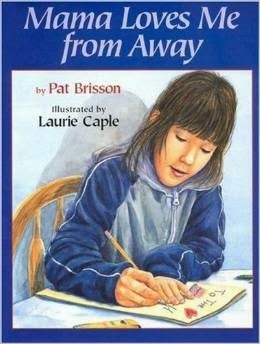
Mama Loves Me From Away by Pat Brisson was published in 2004. It tells the story of a girl, and her mother and how they maintain their relationship while Mom is in prison.

Kofi's Mom by Richard Dyches was published in 2010. This is a story about a little boy whose Mom goes to prison. Lonely and confused, Kofi doesn't know how to express his feelings until his friends help him open up.

Doogie's Dad is by the same author as Kofi's Mom, Richard Dyches, and was published in 2010 as well. It is on the same order as Kofi, but instead of talking to friends at school, Doogie and his sister finally get all their questions answered when Mom takes them to visit Dad in jail.
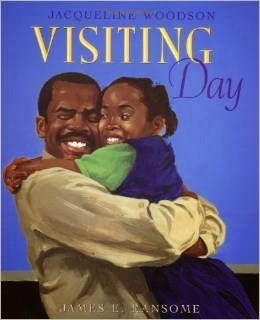
Visiting Day by Jacqueline Woodson was published in 2002. This is my favorite book. It shows that "love knows no bounds" as a little girl and her grandmother prepare for their visit with the little girl's Dad, and he prepares for their long awaited visit.
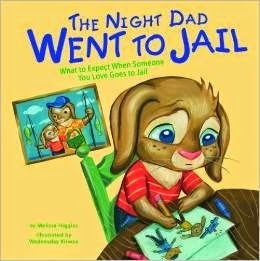
The Night Dad Went to Jail: What to Expect When Someone You Love Goes to Jail by Melissa Higgins was published in 2011. It is a book for the caregiver and the child. It's a heartwarming story that might help ease a child's feelings of loss, fear, and anger.

My Daddy Is In Jail by Janet Bender was published in 2003. It is a resource book designed to help children cope with their feelings when a parent goes to jail. It includes a story, discussion guide, and activities.
Next week, we'll take a look at a few programs designed to help the incarcerated parent learn the skills needed to be better parents.
Kids--all kids--are our future, and it's up to us to determine what that future will be.

A Visit to the Big House by Oliver Butterworth was published in 1993. It tells the story of a brother and sister who are worried about visiting their father in jail until they see him.

Mama Loves Me From Away by Pat Brisson was published in 2004. It tells the story of a girl, and her mother and how they maintain their relationship while Mom is in prison.

Kofi's Mom by Richard Dyches was published in 2010. This is a story about a little boy whose Mom goes to prison. Lonely and confused, Kofi doesn't know how to express his feelings until his friends help him open up.

Doogie's Dad is by the same author as Kofi's Mom, Richard Dyches, and was published in 2010 as well. It is on the same order as Kofi, but instead of talking to friends at school, Doogie and his sister finally get all their questions answered when Mom takes them to visit Dad in jail.

Visiting Day by Jacqueline Woodson was published in 2002. This is my favorite book. It shows that "love knows no bounds" as a little girl and her grandmother prepare for their visit with the little girl's Dad, and he prepares for their long awaited visit.

The Night Dad Went to Jail: What to Expect When Someone You Love Goes to Jail by Melissa Higgins was published in 2011. It is a book for the caregiver and the child. It's a heartwarming story that might help ease a child's feelings of loss, fear, and anger.

My Daddy Is In Jail by Janet Bender was published in 2003. It is a resource book designed to help children cope with their feelings when a parent goes to jail. It includes a story, discussion guide, and activities.
Next week, we'll take a look at a few programs designed to help the incarcerated parent learn the skills needed to be better parents.
Kids--all kids--are our future, and it's up to us to determine what that future will be.
Published on June 15, 2014 16:46
June 8, 2014
Kids With Parents In Jail Series: Skip, Inc.
"Save Kids of Incarcerated Parents" or SKIP, Inc. works through public awareness, advocacy, collaboration and research to help children cope when their parents are in jail.Founded by Mrs. Gloria Jean Canty-Williams in 1976, SKIP was incorporated in Florida in 1980. Since then SKIP has developed chapters in several states to "provide support services to children of incarcerated parents and their families and to increase public awareness."
While researching this series, I found this organization and quickly became a fan when I read how important kids were to them. SKIP views kids as our future, and takes steps to help those kids who need the extra support. What I particularly like about SKIP is their desire to build self-esteem in kids who desperately need it when a parent goes to jail. Instead of kids feeling alone, isolated, worthless, or angry, SKIP offers counseling to work through the anger, and a peer mentor program called "Kids Helping Kids", but, they don't stop there.
SKIP has an educational and enrichment program that recognizes how important it is for kids to develop skills such as problem solving, and they work with kids to learn the basics of communication--verbal and in writing. For older kids, they help them through the maze of career development. Kids learn what work ethics are, how to fill out job applications, and ways to continue their education. When you consider that kids with incarcerated parents are five times more likely to commit a crime than their peers, an organization like SKIP is sorely needed.
If you want to know more about their programs, to volunteer if they have a chapter near you, donate, or even start a chapter, check them out at skipinc.org/. We need more good things like SKIP.
Next week, I will provide a list of the books that are available for kids.
Kids--all kids--are our future, and it's up to use to determine what that future will be.
While researching this series, I found this organization and quickly became a fan when I read how important kids were to them. SKIP views kids as our future, and takes steps to help those kids who need the extra support. What I particularly like about SKIP is their desire to build self-esteem in kids who desperately need it when a parent goes to jail. Instead of kids feeling alone, isolated, worthless, or angry, SKIP offers counseling to work through the anger, and a peer mentor program called "Kids Helping Kids", but, they don't stop there.
SKIP has an educational and enrichment program that recognizes how important it is for kids to develop skills such as problem solving, and they work with kids to learn the basics of communication--verbal and in writing. For older kids, they help them through the maze of career development. Kids learn what work ethics are, how to fill out job applications, and ways to continue their education. When you consider that kids with incarcerated parents are five times more likely to commit a crime than their peers, an organization like SKIP is sorely needed.
If you want to know more about their programs, to volunteer if they have a chapter near you, donate, or even start a chapter, check them out at skipinc.org/. We need more good things like SKIP.
Next week, I will provide a list of the books that are available for kids.
Kids--all kids--are our future, and it's up to use to determine what that future will be.
Published on June 08, 2014 12:41
June 2, 2014
Kids With Parents In Jail Series: Sesame Streets's Little Children, Big Challenges
Leave it to Sesame Street to recognize that kids with parents in jail need support, understanding, and a way to communicate their feelings. The Sesame Workshop is known for educating millions of the world's children, but they are also leaders in helping children deal with a variety of traumas they experience in life. Divorce, Military deployment and Incarcerated Parents are only three of the programs they offer to parents and caregivers. Each program is designed to help children ages 3 to 8 years old talk about their feelings and get the support they need in times of crisis. Their Incarceration Initiative provides free bi-lingual resources for both the parents/caregivers and the child.
While most information available for children with a parent(s) in jail, centers on statistics and studies, this program actually reinforces the specific needs of a child--any child--who feels abandoned. First, and most important, is to make the child feel safe. When a parent goes to jail, even if one parent is still at home, the child's world is turned upside down. The program emphasizes the need to reassure the child by "surrounding her with reliable people and daily activities," and letting the child know exactly who is going to be there for them at all times.
It also shows how important honesty is to a child. Children are very observant. They know when someone is not being honest. They need to know where Mommy or Daddy went, and why. Without that information, children will blame themselves for the separation. They wonder: What did I do wrong? Being honest may be difficult for the caregiver, but it is the only way to let the child know it is not his/her fault.
If you are caring for a young child whose parent(s) are in jail, go to the Sesame Street website and access their Little Children, Big Challenges workshop for kids with a parent in jail. It will help you open conversations with your child. It even covers how to prepare the child for visiting the parent(s) at jail.
Next week, I will talk about a fantastic program founded in 1976 and still going strong.
While most information available for children with a parent(s) in jail, centers on statistics and studies, this program actually reinforces the specific needs of a child--any child--who feels abandoned. First, and most important, is to make the child feel safe. When a parent goes to jail, even if one parent is still at home, the child's world is turned upside down. The program emphasizes the need to reassure the child by "surrounding her with reliable people and daily activities," and letting the child know exactly who is going to be there for them at all times.
It also shows how important honesty is to a child. Children are very observant. They know when someone is not being honest. They need to know where Mommy or Daddy went, and why. Without that information, children will blame themselves for the separation. They wonder: What did I do wrong? Being honest may be difficult for the caregiver, but it is the only way to let the child know it is not his/her fault.
If you are caring for a young child whose parent(s) are in jail, go to the Sesame Street website and access their Little Children, Big Challenges workshop for kids with a parent in jail. It will help you open conversations with your child. It even covers how to prepare the child for visiting the parent(s) at jail.
Next week, I will talk about a fantastic program founded in 1976 and still going strong.
Published on June 02, 2014 09:15



